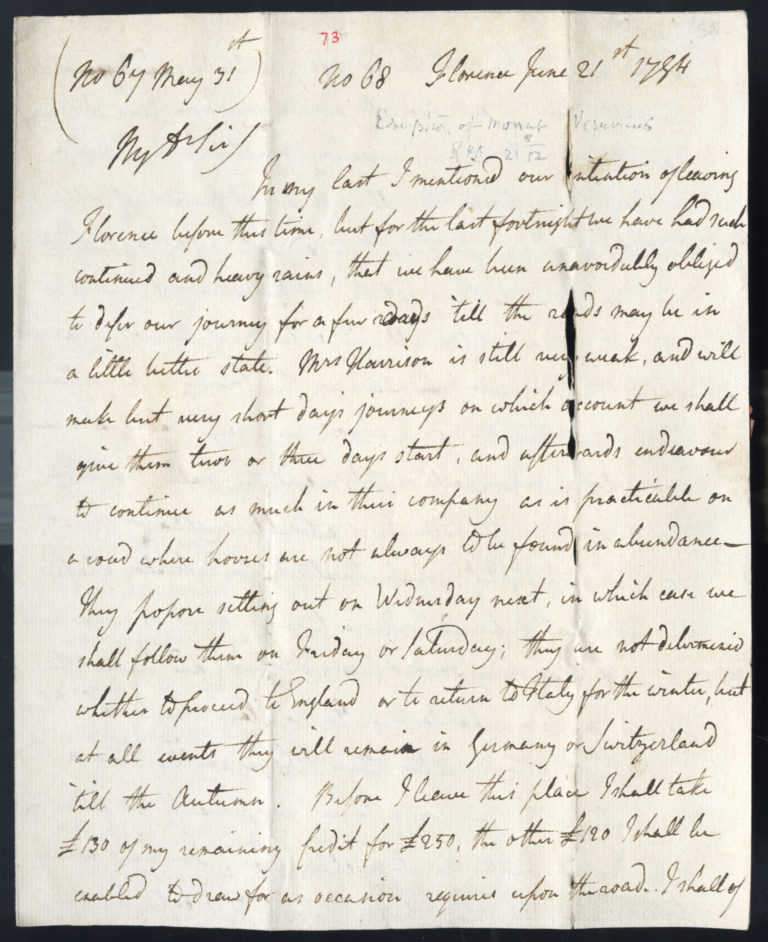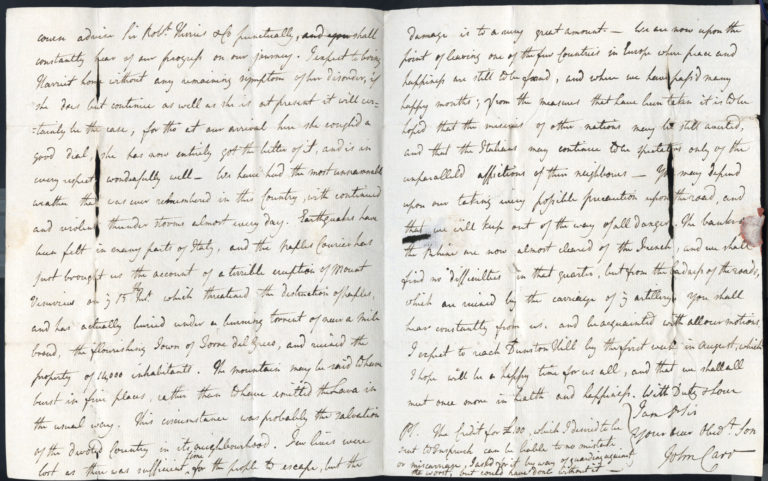Letter From John Carr About The Perils Of Travelling Through Europe, 1794
Reference: ZCE F/1/1/1/144
Topics: French Revolutionary Wars, The Grand Tour, Travel Writing
LETTER FROM JOHN CARR TO RALPH CARR
This letter, written to Ralph Carr towards the end of John and Harriet Carr’s tour, shows some of the perils of travel during a period of war in the late 18th century. Brother and sister had intended to leave for England in early 1792 but the outbreak of the Franco-Austrian War prevented this. The letter is written from Inspruck, [Innsbruck] Austria and refers to at least three perils of travel at this time – delays due to the political situation, damage to carriages, in this case probably because of the state of the roads, and weather conditions.
In the first paragraph John tells his father that he decided to delay starting the journey home because of fears that the route from Florence was impassable. There may be a further delay leaving Innsbruck as the chaise used by the Carrs needs some repairs. This is likely to have been due to the state of the roads. As it is uncertain how long the rest of the journey might take John has drawn some monies at a local bank using the letter of credit provided by Sir Robert Herries [& Co.], a London bank. Carrying large sums of cash was considered dangerous so London banks issued letters of credit to British tourists that could be drawn upon locally. John seems keen to inform his father of his expenditure. The Tour was extended for two years because of the political situation in Europe and this brought Ralph Carr unexpected cost.
In the second paragraph John writes of the current political situation. He makes reference to the death of Robespierre (Maximilien de Robespierre, 1758-1794, radical lawyer and statesman and a key figure in the French Revolution). John has been assured by ‘the Banker who seems a good sturdy matter of fact German’ that Robespierre was dead. This was reassuring news. John now believed ‘we have reason to think that we shall meet with no impediment or difficulty in our road to Coblentz, from thence we shall descend the river to Rotterdam, or otherwise as we are informed on the spot’. The banker’s account was untrue. Robespierre was executed on 28 July 1794. His reported death was a rumour that proved to be incorrect. John and Harriet were to continue their journey home in safety.
ADDITIONAL RESOURCES
(No 71 Florence July 28) No 72 Inspruck Aug[us]t 13th 1794
My D[ea]r Sir
My last would have informed you that we thought it adviseable to remain some time longer at Florence ’till we had an account of what road we could take. We had reason to think that every possible passage was shut up as the mails had been detained ’till eight were due. The day after four of these mails arrived, we set out on our journey on the 6 (sic) of this month, and have this instant arrived here safe and well. We have had no kind of accident, but our Chaise has need of some repairs which may possibly detain us here tomorrow. I have just been at the Bankers where I found Sir Rob[er]t Herries’ letter enclosing the £100 I had desired to meet me here. Not knowing what route we were to take or how long we might be detained in the interior of Germany, as well as to provide against the almost impossibility of the miscarr[iage] of either my letter to Sir Rob[er]t Herries, or of his enclosing the notes for £100, I chose to keep the remainder of my old Credit for £400, (which is now reduced to £120) and in consequence of this precaution on the 4th Aug[us]t I drew in favour of Orsi at Florence for £50, which is independent of any Credit lodged by Sir Rob[er]t Herries & Co of which I addressed them by the same Post, and which they will honour when the Bill becomes due in three months. This I thought expedient at the time, having been detained at Florence longer than I had expected, and wishing to guard against all possibility of inconvenience on the road, whatever might happen. Having rec[eive]d the £100 this was unnecessary, but nothing can lost by it, as I shall have so much the more remaining.
We have so often heard of the death of Robespierre that we were become incredulous on that head, but the Banker who seems a good sturdy matter of fact German has assured me of it so positively that I can no longer doubt, and we have reason to think that we shall meet with no impediment or difficulty in our road to Coblentz, from thence we shall descend the river to Rotterdam, or otherwise as we are informed on the spot. You shall hear regularly of our motions, and fear nothing for our safety wherever we may be. This is the first opportunity I have had of writing since we left Florence otherwise you should have heard from me. Harriet is perfectly well and bears the journey even better than I do which is saying a great deal. We shall remain here to rest tomorrow, though we have not suffered any great fatigue having never been out very early or very late. We shall pursue our journey in the same way, and shall take every possible precaution to avoid all dangers. I have rec[eive]d a letter from Mr Harrison who was frightened away from Stutgard by the French tho’ he had the Rhine and 80 miles between him and them. He has alter’d his second plan of going to Vienna and says that he shall proceed to England. It would be impracticable to travel with two carriages in company as far as we have com[e] and the want of horses is still greater in the interior part [of] Germany. We left many English families in Florence and the neighbourhood, and many at Milan, the danger which threatened Italy seems to be dissipated and if the news we have heard here from Paris prove true, we may hope for some more favourable turn of affairs. I shall hope to find a letter at Franckfort, but should the French be at Manheim we will steer more to the Eastward, and I will write for my letters from Franckfort – we will never come within 50
miles of danger therefore once more be under no apprehensions. We join in Duty & Love. I am D[ea]r Sir your ever Dut[iful] Obed[ien]t J. C
Chaise – a form of carriage used by wealthy travellers.
Orsi – Messrs. Orsi, bankers in Florence.
The Wars of the French Revolution: 1792-1801 by Charles J. Esdaile (Routledge (2018)
The French Revolutionary Wars by Gregory Fremont-Barnes (Osprey Publishing, 2014)
Revolutionary France’s War of Conquest in the Rhineland: Conquering the Natural Frontier, 1792-1797 by Jordan R. Hayworth (Cambridge University Press, 2019)
The Origins of the French Revolutionary Wars by T.C.W. Blanning (Routledge, 2017)



